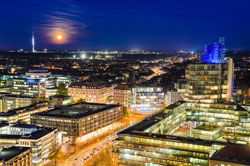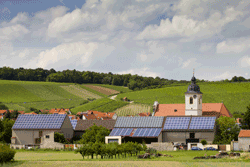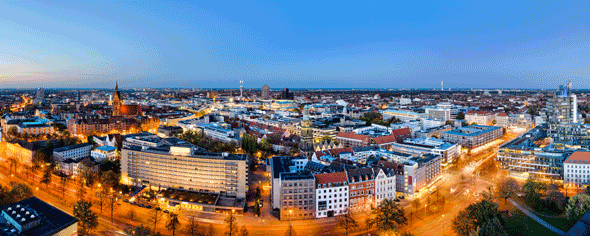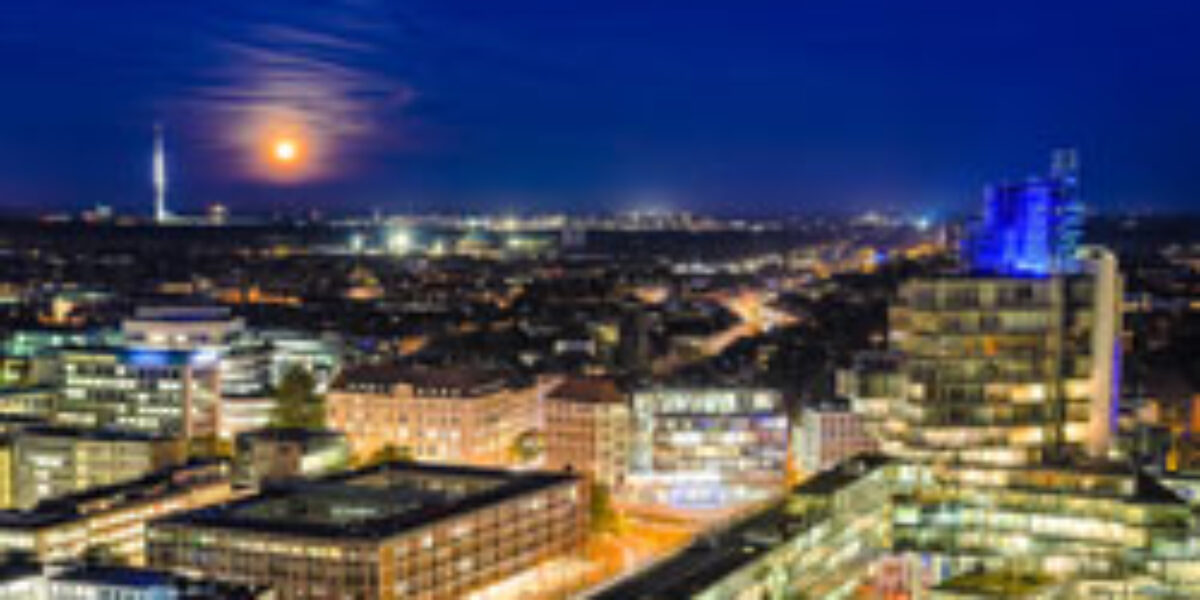Location Germany is where the sensible money goes
 There is little doubt that while the good ship Europe lurches through the stormy waters of discontent, Germany is the anchor keeping it steady and afloat.
There is little doubt that while the good ship Europe lurches through the stormy waters of discontent, Germany is the anchor keeping it steady and afloat.
‘Made in Germany’ is a global benchmark for efficiency, quality and stability at affordable prices. The moderately-paid, well-educated, internationally astute and frequently multi-lingual employee base, backed up by a cutting edge infrastructure, makes the country a shining prospect for foreign direct investment to start with. Throw in the Mittelstand, a vast number of small-to-medium enterprises (499 employees or under) which constitutes 99.6% of all German companies and employs 60.2% of all Germany’s social insurance-contributing employees and which is producing innovation in all sectors of industry at an extraordinary rate, and you have all the ingredients in the recipe for success.
Having created that recipe, the German government is backing it up with vigorous incentives for those willing to try it, well beyond Germany’s pre-existing geographical advantage at the heart of Europe and position of strength in Europe’s economy. Low-interest loans, labour-related incentives, straight cash incentives, flexible and transparent employment models and R&D grants are all available to suitable candidates.
Germany is thus sitting pretty in the eyes of the world. 35 per cent of investors in this year’s Ernst & Young European Attractiveness Survey see Germany as Europe’s most attractive FDI location and 13 per cent see it as the most attractive country in the world. In the AmCham Business Barometer study 2012, 39 per cent of the surveyed managers named Germany’s stability, reliability, security and continuity as reasons to invest there, 37 per cent mentioned well-educated and industry-skilled labour. In the World Economic Forum’s Global Competitiveness Report 2012-13, Germany ranked 3rd out of 144 countries in terms of infrastructure, behind only city states Hong Kong and Singapore. The International Institute for Management Development’s (IMD) World Competitiveness Yearbook said Germany had the ‘best scientific infrastructure in Europe and third best in the world after the USA and Japan’. The transport and logisitics infrastructure was rated the world’s best in the World Bank’s Logistics Performance Index for 2012, while Ernst and Young found that 88% of surveyed managers rated Germany’ transport and logistics infrastructure as ‘attractive’ or ‘very attractive’, 86% of them rating the telecommunications infrastructure in the same approving terms.
 Going German, going green
Going German, going green
One of Germany’s most talked-about industries at present is renewable energies. Under the government’s Energiewende (Energy Transition) policy, which aims to de-nuclearise Germany’s power completely and take a 60% share of Germany’s total power consumption from renewable energies by 2050, there is a widespread drive to get windparks, photovoltaic sites, hydro-electric sites and bio-energy sites up and running with both domestic and foreign investment. Furthermore, investment is also being lured to Germany to help develop smart power grids and energy storage capacity through incentives and grants, in the hope of solving the current problems of excess power being produced.
Renewable energy thus remains the most popular sector for foreign investors. “Nearly one quarter of the projects registered at Germany Trade & Invest in 2012 came from the fields of photovoltaics and wind energy,” said Dr. Robert Hermann, Managing Director Investor Consulting at Germany Trade & Invest, Germany’s foreign trade and inward investment promotion agency. “Although numerous solar companies globally have been forced to close in recent months, investments in the industry still remain profitable… Above all, the change to the feed-in tariff that helps to promote photovoltaics, the presentation of the grid development plan, and the preliminary results from the ‘Acceleration of Offshore Grid Connections’ working group have generated new opportunities and investment potential – particularly in terms of constructing new, smarter grid infrastructure. This holds true for foreign companies, as well.”
Fahren Fahren Fahren Auf Der autobahn
Not unrelated to renewable energies and environmental awareness generally is the looming launch of e-mobility, with the Bayerische Motoren Werke (that’s BMW to you and I) ready to roll out their new i3 later in 2013. Battery technology and a number of other related industries, rather than the car manufacturing industry itself, are attracting investment from around the world, with suppliers keen to capitalise on Germany’s determination to dominate this market and get 1m electric vehicles on the road by 2020.

industria sana in regionem sano
Germany’s commitment and success in the field of life sciences – particularly biotechnology, medical technology and pharmaceuticals – is well-known. Germany is Europe’s beating heart in the biopharmaceuticals sector and the world’s second leading power behind the USA. A quick glance at Germany’s impressive results confirms an obvious fact: medical biotech is booming. Germany trails only the USA in global biopharmaceutical production as well. Just one year after the global economic downturn in 2010, the German biopharmaceuticals market recorded an eight per cent increase in sales on the previous year, continuing to grow apace since.
cluster boom
In both Berlin and Dresden, cutting edge technology is leading the way. The nation’s capital is cementing a reputation for being the home of a start-up revolution, as hundreds of young, tech-savvy people head for the lower-than-average rents and sound technological infrastructure to get their niche softwares, apps and websites up and running. Christophe Maire, who started up global pacemaker production leader Biotronik and now advises start-up companies in Berlin on how to succeed, has said of the city’s explosion: ‘we are in the middle of a revolution here, from which the large firms of tomorrow will come into existence.’ Meanwhile in Dresden, the Organic Electronics Saxony cluster groups together 39 companies and 17 research institutes covering the whole value chain, starting at universal fundamental research up to high end technological products. At the recent CeBit expo, data spectacles which comprised a microscopic computer screen steered by eyeball movement and won the Mittelstand Initiative prize for Innovation hailed directly from the cluster, among many other innovations. Munich is a globally-renowned media cluster, Hamburg is still the place to be if you are producing computer or video games, Nordrhein-Westfalen continues to be a location for energy business needs of all kinds.

Welcome to Europe
The European business world is currently awaiting the outcome of the USA-EU free trade talks, Germany especially so. For with its quality products, huge export market and value for money offered, should the gateway to the USA market be thrown wide open Germany is in pole position to be the supplier of the inevitable increase in foreign demand. Those who want to be a part of that will find the best way to do it is to be on the spot, and will not be disappointed.


